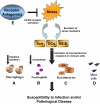Antimicrobial anxiety: the impact of stress on antimicrobial immunity
- PMID: 20442225
- PMCID: PMC2908944
- DOI: 10.1189/jlb.1109740
Antimicrobial anxiety: the impact of stress on antimicrobial immunity
Abstract
Leukocytes and epithelial cells are fundamental to antimicrobial immunity. Their antimicrobial responses are an evolutionarily conserved component of the innate immune system and are influenced by the host's response to external stimuli. The efficacy of host defense via antimicrobial responses derives from the ability of AMPs to rapidly identify and eradicate foreign microbes and activate proinflammatory pathways, and from the capacity of later innate and adaptive immune responses to amplify protection through distinct biochemical mechanisms. Recent advances in neuroimmunology have identified a direct link between the neuroendocrine and immune systems, where environmental stimuli are generally believed to promote a transient effect on the immune system in response to environmental challenges and are presumably brought back to baseline levels via neuroendocrine pathways. Stress is an environmental stimulus that flares from a variety of circumstances and has become engrained in human society. Small bouts of stress are believed to enhance the host's immune response; however, prolonged periods of stress can be detrimental through excess production of neuroendocrine-derived mediators that dampen immune responses to invasive pathogens. Elucidation of the mechanisms behind stress-induced immune modulation of antimicrobial responses will ultimately lead to the development of more effective therapeutic interventions for pathologic conditions. It is the intent of this review to broaden the existing paradigm of how stress-related molecules dampen immune responses through suppression of antimicrobial mechanisms, and to emphasize that bacteria can use these factors to enhance microbial pathogenesis during stress.
Figures




References
-
- Locke S E. Stress, adaptation, and immunity: studies in humans. Gen Hosp Psychiatry. 1982;4:49–58. - PubMed
-
- Fox B H. Premorbid psychological factors as related to cancer incidence. J Behav Med. 1978;1:45–133. - PubMed
-
- Haggerty R J. Breaking the link between stress and illness in children. What role can physicians play? Postgrad Med. 1983;74:287–291. 294–295. - PubMed
-
- Koehler T, Weber D. Psychophysiological reactions of patients with atopic dermatitis. J Psychosom Res. 1992;36:391–394. - PubMed
-
- Garrett V D, Brantley P J, Jones G N, McKnight G T. The relation between daily stress and Crohn’s disease. J Behav Med. 1991;14:87–96. - PubMed

